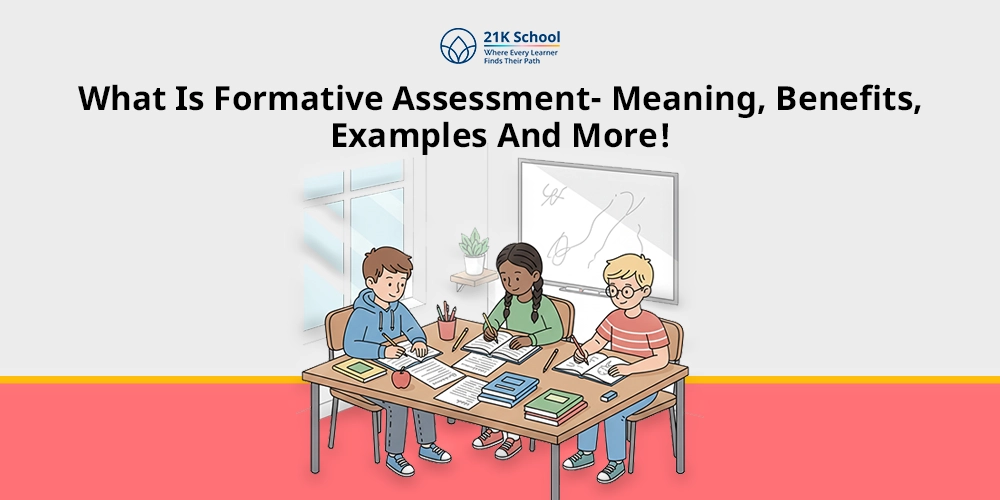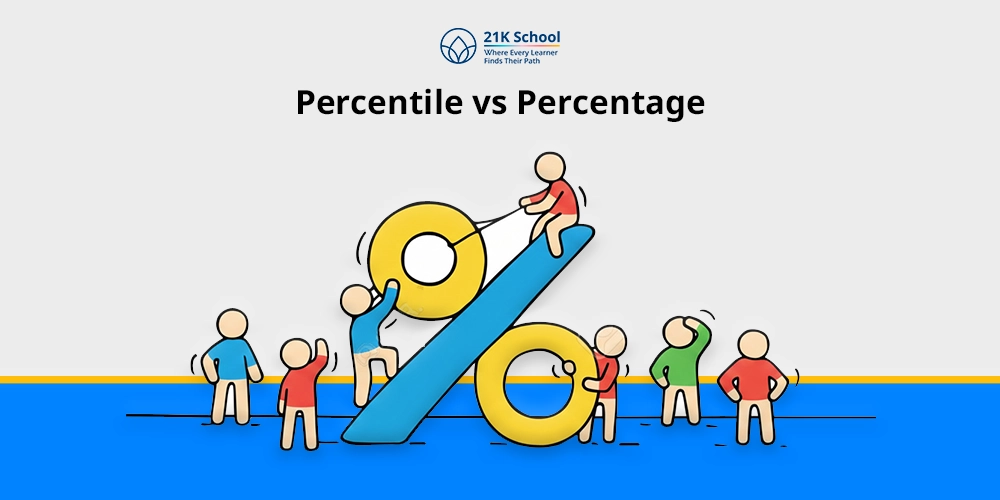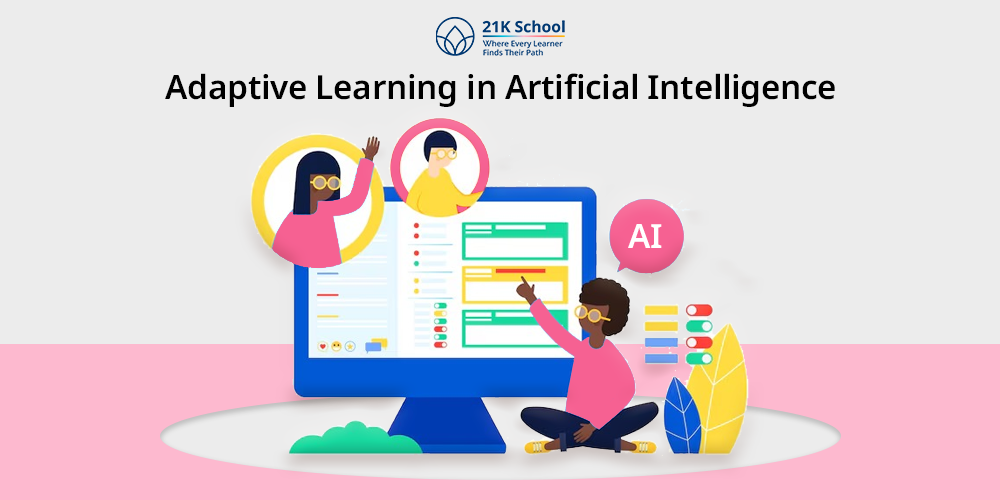
Adaptive learning with the integration of AI, plays an important role in the teaching and learning process, but how?
AI in adapting learning uses data or computer algorithms in order to enhance the educational experience. The contribution of technology to education has made education more accessible and allows students to study from any location.
Implementation of Artificial Intelligence (AI) into education makes learning more impactful and easy for students as well as teachers. Implementation of AI in adaptive learning also helps in providing personalised education , meeting the diverse needs of every student.
Through the individualised learning experience that adaptive learning provides, students can tailor their educational needs. Adaptive learning is the antithesis of traditional learning , which places an emphasis on a customised education.
By transforming students’ learning methods, adaptive learning aims to improve students’ learning experiences through the use of artificial intelligence (AI) in the classroom.
Data-driven technology has led to the implementation of AI in a number of industries, including banking, healthcare, corporate and education. This flexibility increases accessibility and engagement in the learning process.
Contents
What is Adaptive Learning?
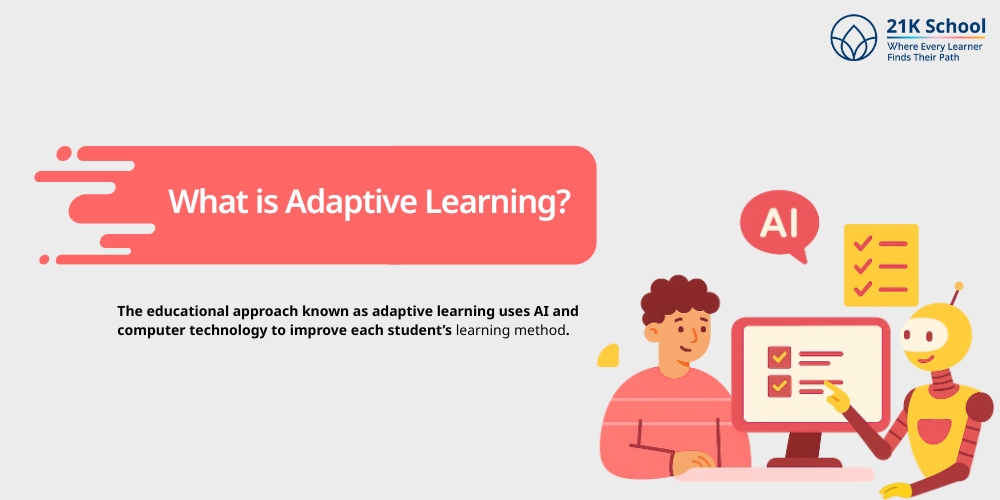
The educational approach known as adaptive learning uses AI and computer technology to improve each student’s learning method . The primary goal of adaptive learning is to give students real education, real-time engagement and personality development content.
Adaptive learning systems use algorithms and data analytics to assess learners’ learning pace, preferences and areas of strength and weakness.
Adaptive learning is a teaching strategy that enhances each student’s learning experience by utilising AI and computer technology. Providing students with real education, real-time engagement and personality development content is the main objective of adaptive learning.
Algorithms and data analytics are used by adaptive learning systems to evaluate learners’ learning styles, strengths and weaknesses.
Role of Adaptive Learning in Artificial Intelligence
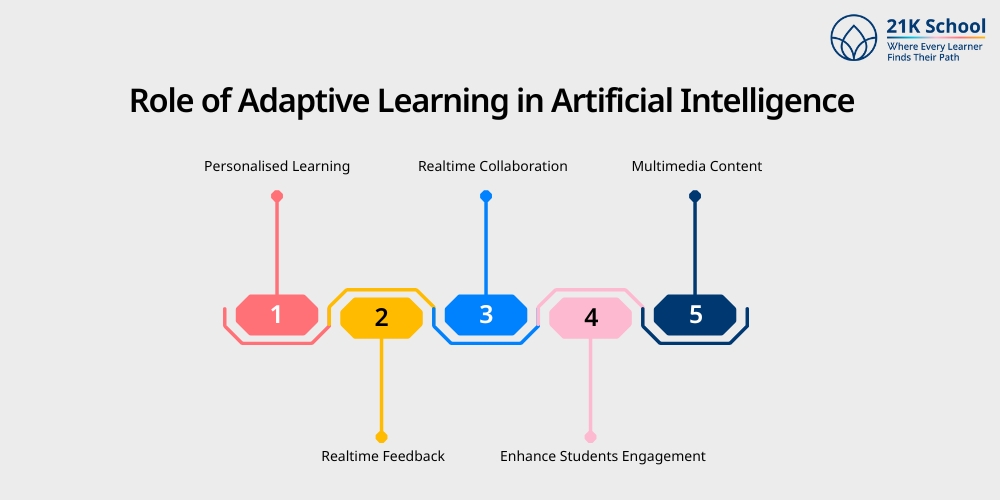
Adapting learning in AI plays an integral role in making education more effective and meeting the diverse needs of every student. Integration of AI in adaptive learning allows individuals to develop problem-solving skills by creating a curious learning environment.
With the help of AI in an adaptive learning classroom, education becomes fun learning and productive. The following are the roles of adaptive learning in AI.
1. Personalised Learning
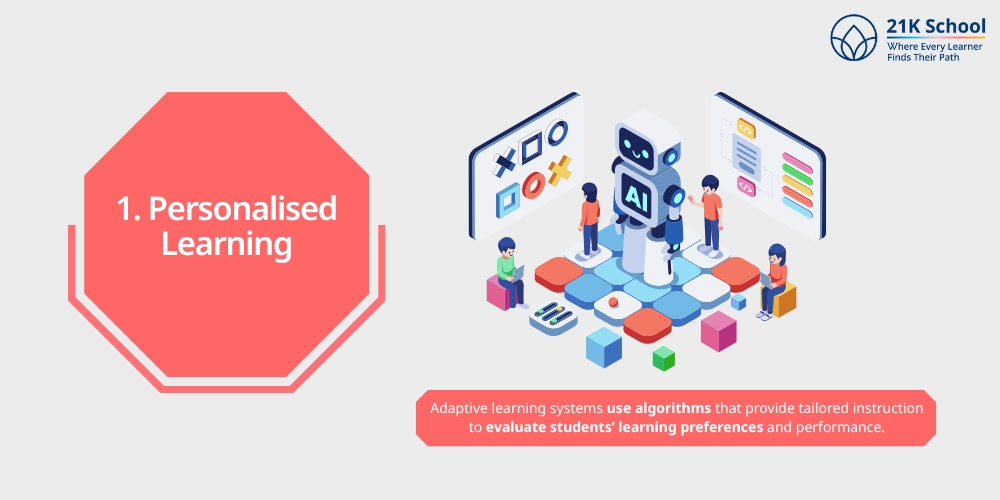
Adaptive learning systems use algorithms that provide tailored instruction to evaluate students’ learning preferences and performance.
Task difficulty can be altered with AI-powered adaptive learning by assessing each person’s preferences, weaknesses and strengths. Students can learn at their own pace with this personalisation and they are assured to grasp concepts before going on to more difficult subjects.
2. Realtime Feedback
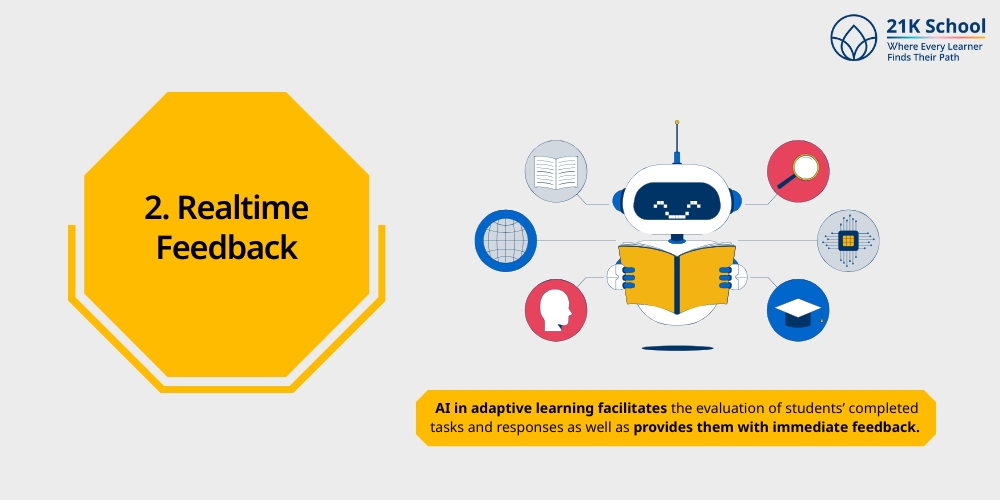
AI in adaptive learning facilitates the evaluation of students’ completed tasks and responses as well as provides them with immediate feedback.
Through real-time feedback, teachers can provide students with their weaknesses and areas for improvement. Real-time feedback allows children to understand in which areas they have to work for their improvement. This also allows parents and educators to check students’ progress.
3. Realtime Collaboration
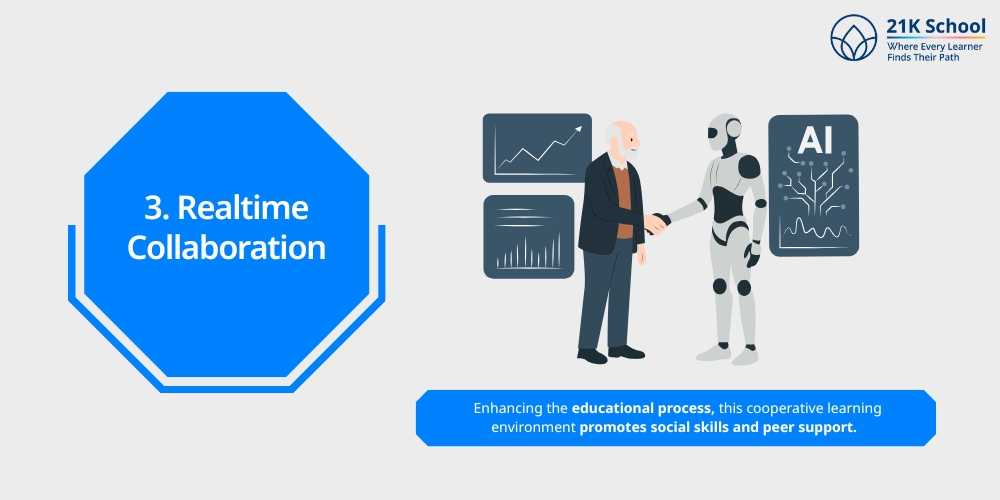
The implementation of AI in adaptive learning promotes a collaborative learning environment through the use of cooperative learning tools, which allows children to work together, without any physical location.
In addition to enhancing the educational process, this cooperative learning environment promotes social skills and peer support.
4. Enhance Students Engagement
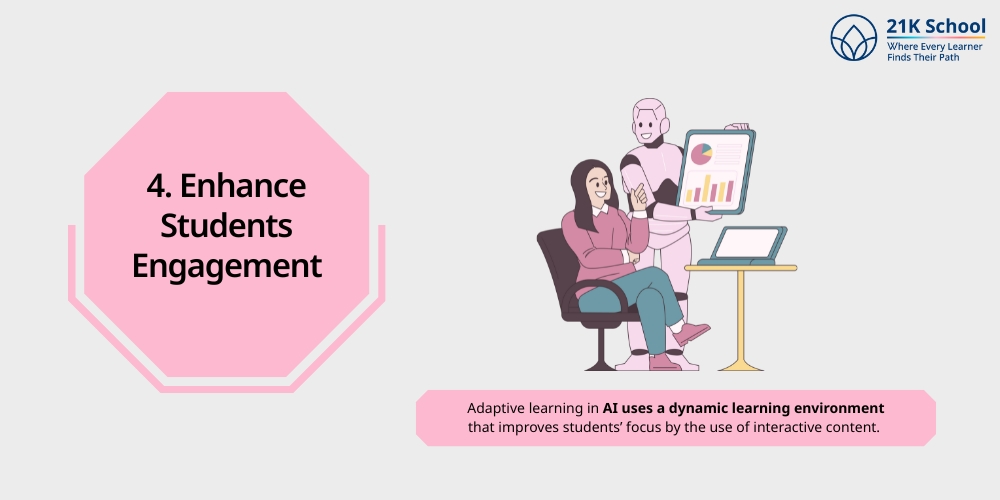
Adaptive learning in AI uses a dynamic learning environment that improves students’ focus by the use of interactive content. These tools can improve learning by utilising game-based learning with challenges, rewards and progress monitoring.
The likelihood of retaining information and developing a deeper understanding of the subject matter is higher for active learners.
5. Multimedia Content
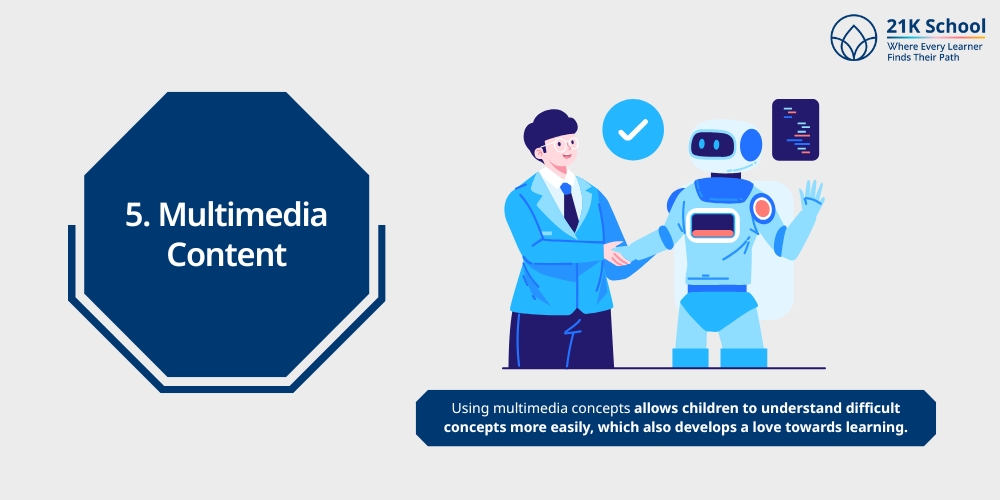
Implementation of AI in adaptive learning makes education a fun learning approach, by using interactive videos, simulations, games, 3D works, and so on. These online learning resources help in enhancing students’ learning outcomes by making them engaged towards education.
Using multimedia concepts allows children to understand difficult concepts more easily, which also develops a love towards learning.
Benefits of Adaptive Learning in Artificial Intelligence
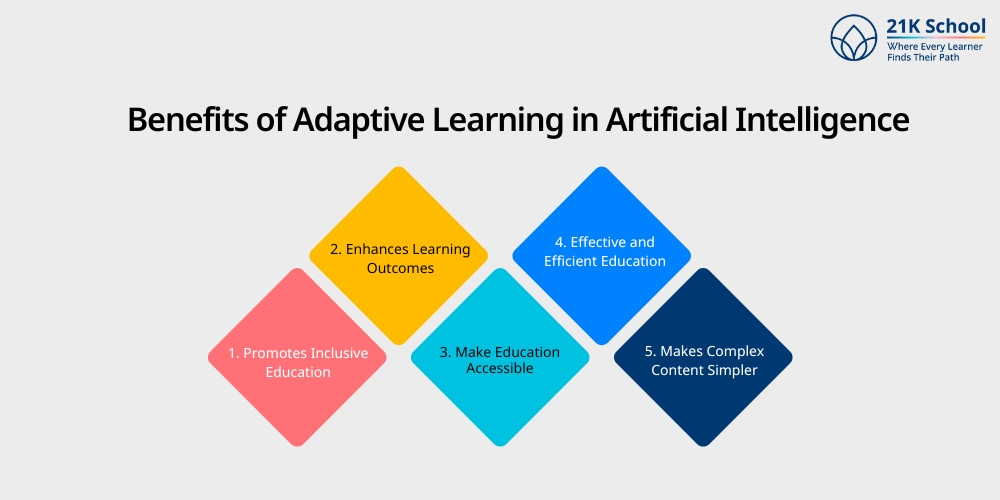
Adaptive learning in AI plays an integral role in developing children’s holistic education . Adaptive learning with the help of AI is known for enhancing childrens academic performance and efficiency.
The implementation of technology and AI tools helps in increasing educational accessibility, enabling them to study from any location, irrespective of any challenges.
Combining AI and adaptive learning assists in making education more effective and helps in breaking down difficult contexts into simpler ones. The following are the benefits of adaptive learning in AI.
1. Promotes Inclusive Education
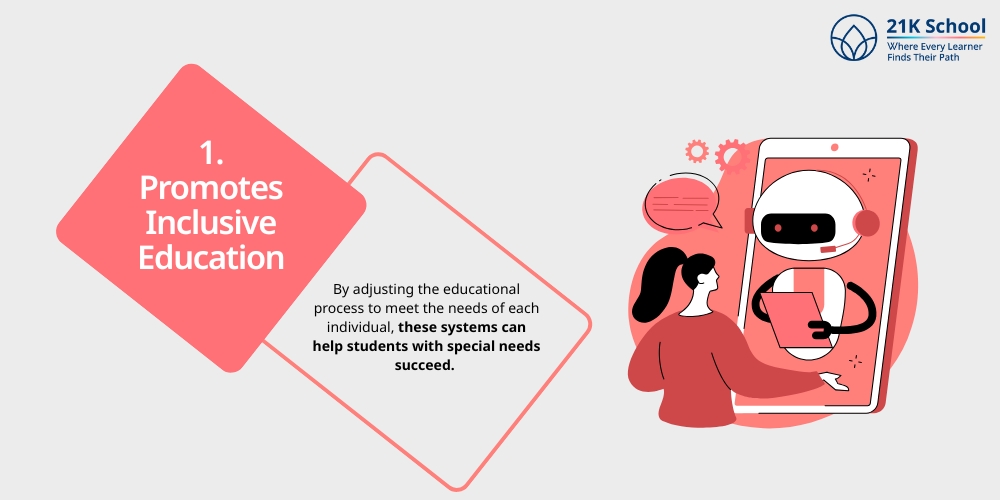
An inclusive learning environment is promoted by AI in adaptive learning, which is made to accommodate a wide variety of learners, including those with learning disabilities and different learning styles.
By adjusting the educational process to meet the needs of each individual, these systems can help students with special needs succeed. Everyone may flourish in a more equitable and inclusive learning environment as a result.
2. Enhances Learning Outcomes
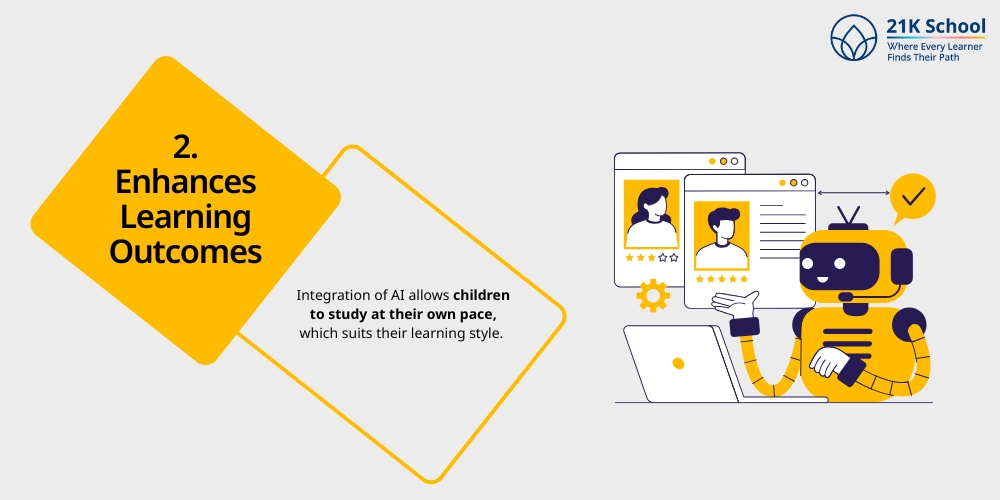
Adaptive learning with AI is known for enhancing students’ learning outcomes, by providing them with personalised learning experiences and real-time feedback. Integration of AI allows children to study at their own pace, which suits their learning style.
This Implementation allows children to focus on their studies along with other activities. With the help of AI, students can receive a personalised learning experience, through which they can understand their weaknesses and strengths.
3. Make Education Accessible
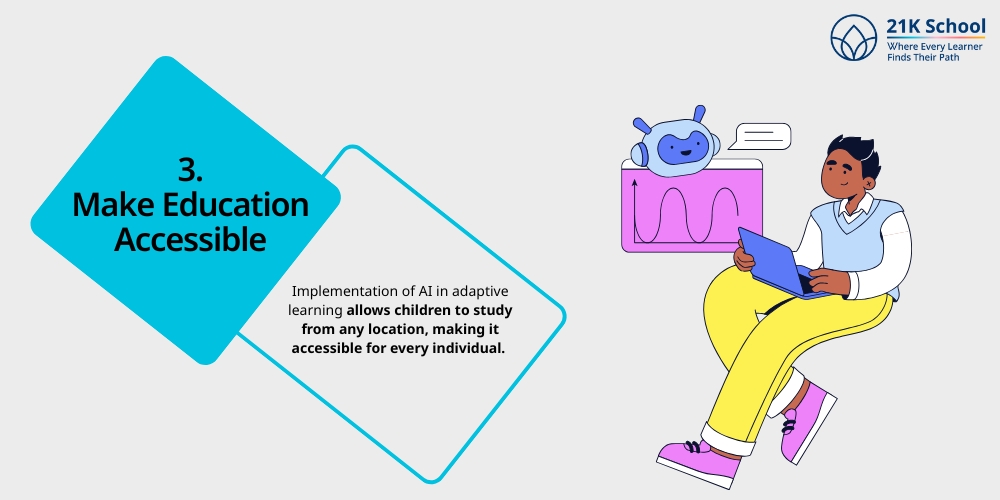
Implementation of AI in adaptive learning allows children to study from any location, making it accessible for every individual.
With the integration of technology in education and AI, students can easily study from any device and resources such as computers, tablets, smartphones and so on. This flexibility allows children to complete their education from anywhere at any time.
4. Effective and Efficient Education
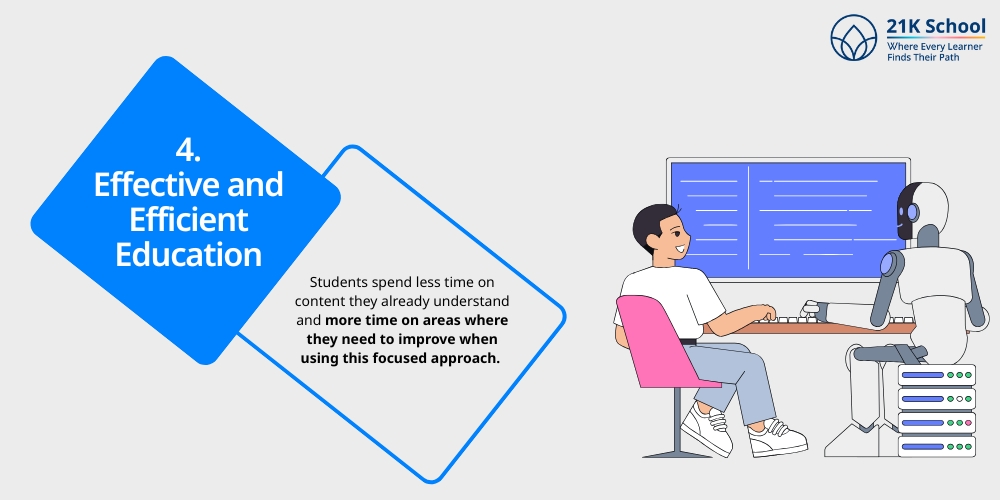
Adaptive learning maximises the educational process by concentrating on the individual needs of every student. Students spend less time on content they already understand and more time on areas where they need to improve when using this focused approach.
By using data analytics from adaptive learning systems this helps teachers can spot trends and make decisions about curriculum and instruction.
5. Makes Complex Content Simpler
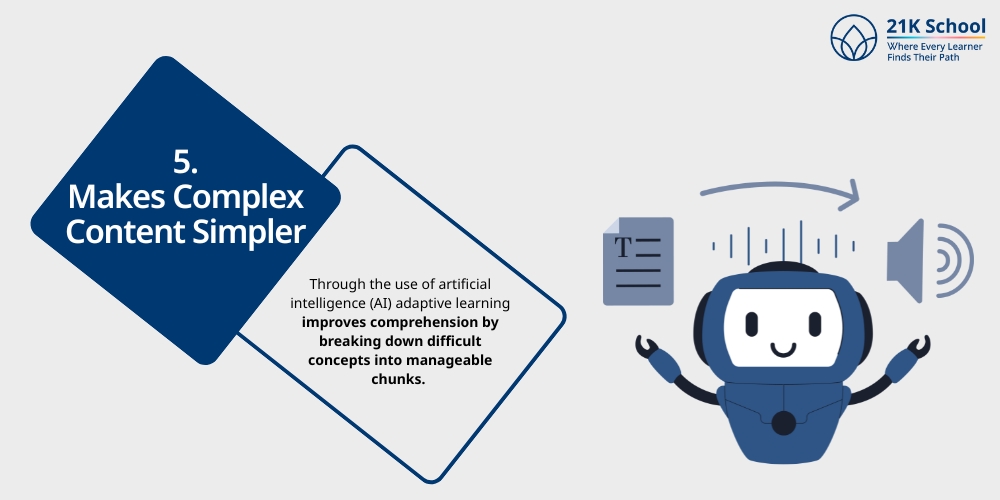
Through the use of artificial intelligence (AI) adaptive learning improves comprehension by breaking down difficult concepts into manageable chunks.
Students can use this to simplify difficult situations and adjust their studies to fit their preferred learning style. By presenting information in an orderly and simple way, these systems help students understand difficult subjects.
Applications of Adaptive Learning in AI
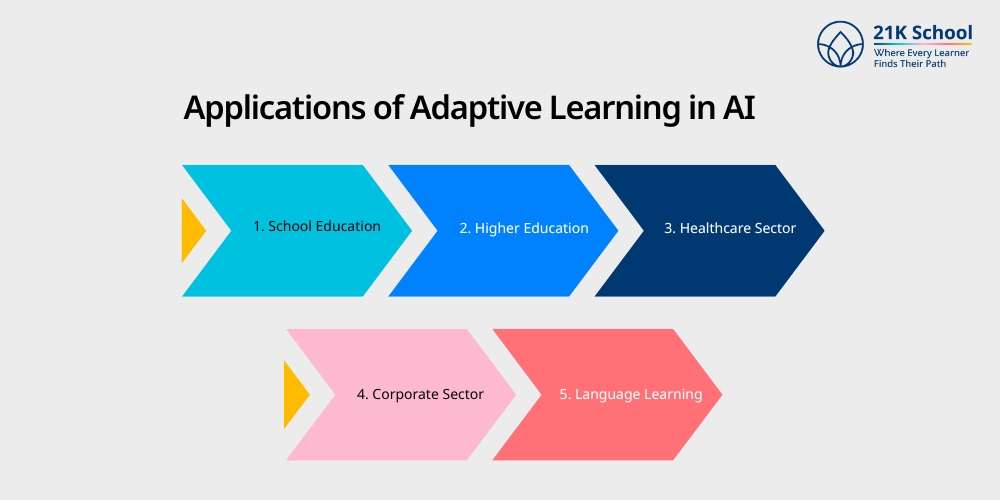
Adaptive learning in AI is not only limited to education but is widely used in every field. Applications of adaptive learning focus on creating a positive learning environment that enables every individual to gain insights from work experiences. Here you can check the applications of adaptive Learning in AI.
1. School Education
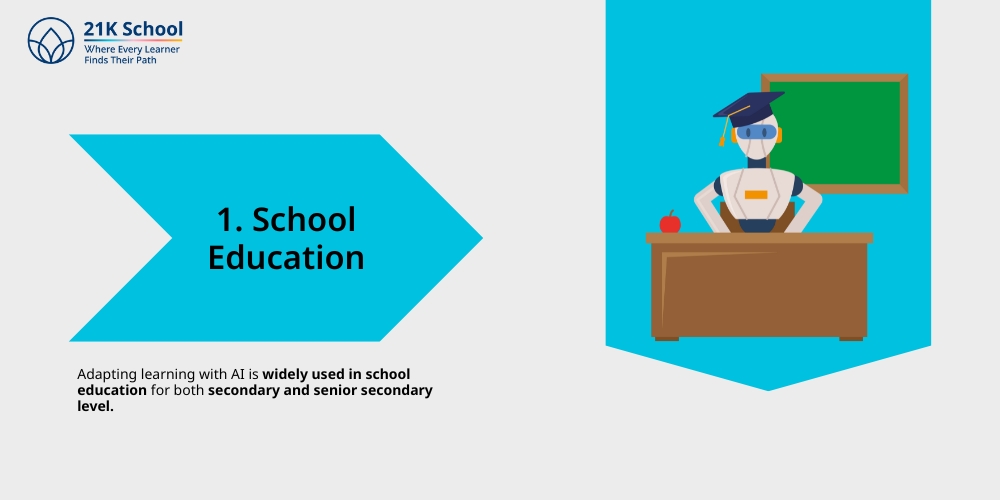
Adapting learning with AI is widely used in school education for both secondary and senior secondary level. AI in adaptive learning emphasises student-centred learning and allows students to study at their own pace.
Adaptive technology is utilised by numerous online schools such as Dreams Time School, Prisma Online School, 21K School and others to provide their students with an excellent education.
2. Higher Education

Higher education, especially in colleges and universities, also uses adapting learning. Traditional lectures are being replaced in higher education by flexible competency-based learning , which is made possible by adaptive learning platforms.
When recommending the best study schedules , AI considers how students use discussion boards, digital textbooks and homework . Students find learning easier as a result which frees them up to concentrate on other tasks or careers.
3. Healthcare Sector
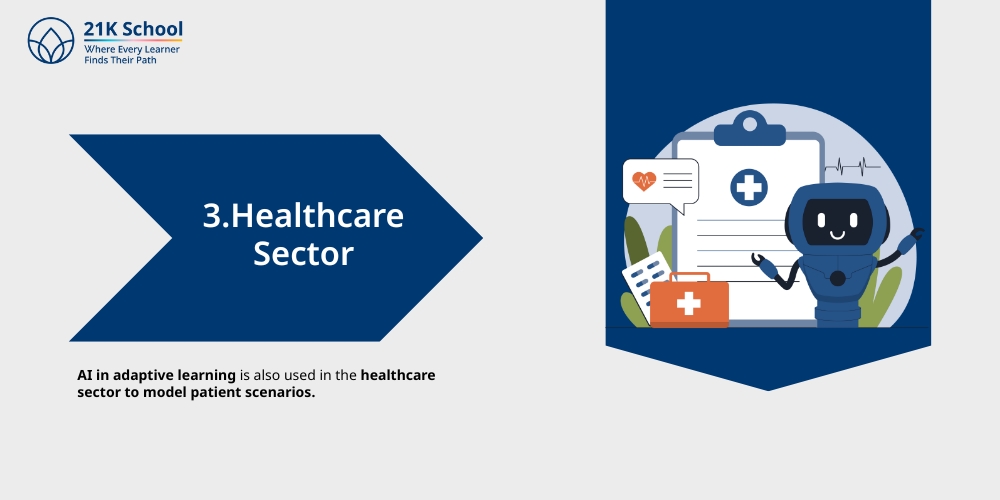
AI in adaptive learning is also used in the healthcare sector to model patient scenarios. To ensure that compliance training adapts to each employee’s knowledge gaps and pace without disrupting workflows, hospitals also use adaptive microlearning for staff certifications.
This has made it possible for medical professionals to understand the workflow and other related procedures.
4. Corporate Sector
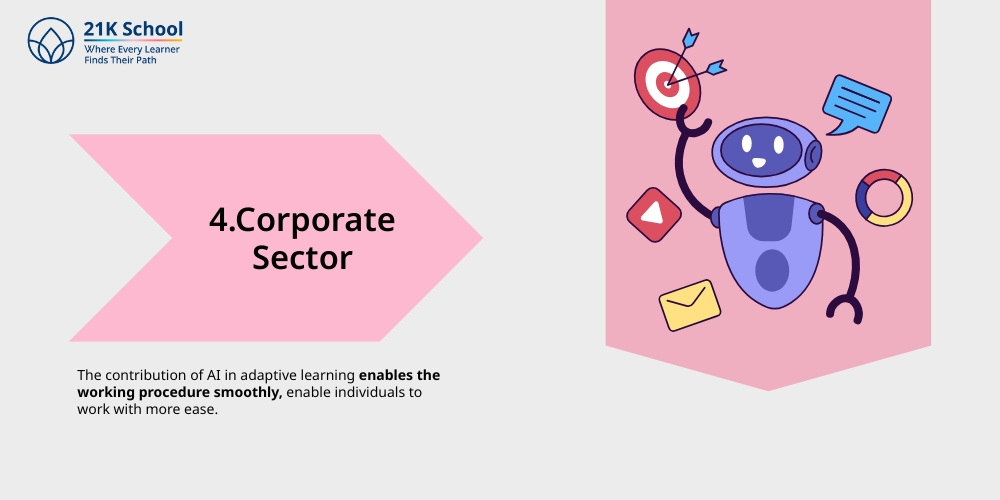
Adaptive learning is not only limited to education but is also widely used in the corporate sector. The contribution of AI in adaptive learning enables the working procedure smoothly, enable individuals to work with more ease.
Corporate sectors use AI-powered tools to make it easier for working professionals to work on a wide range of assignments. This also helps in the work process faster and easier to understand.
5. Language Learning
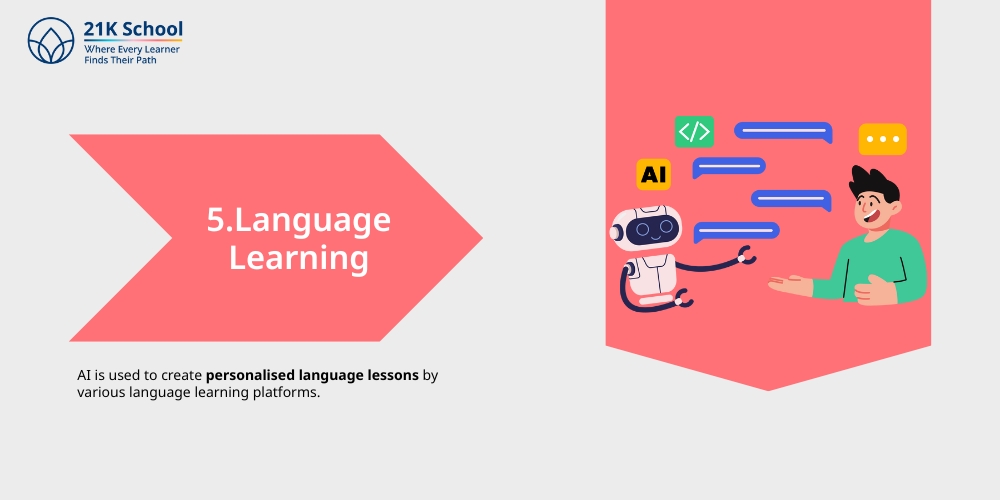
Adaptive learning in AI can also be used for language learning. AI is used to create personalised language lessons by various language learning platforms.
This allows students to gain language skills through real-time pronunciation and grammar corrections, along with vocabulary drills.
Disadvantages of Adaptive Learning in AI
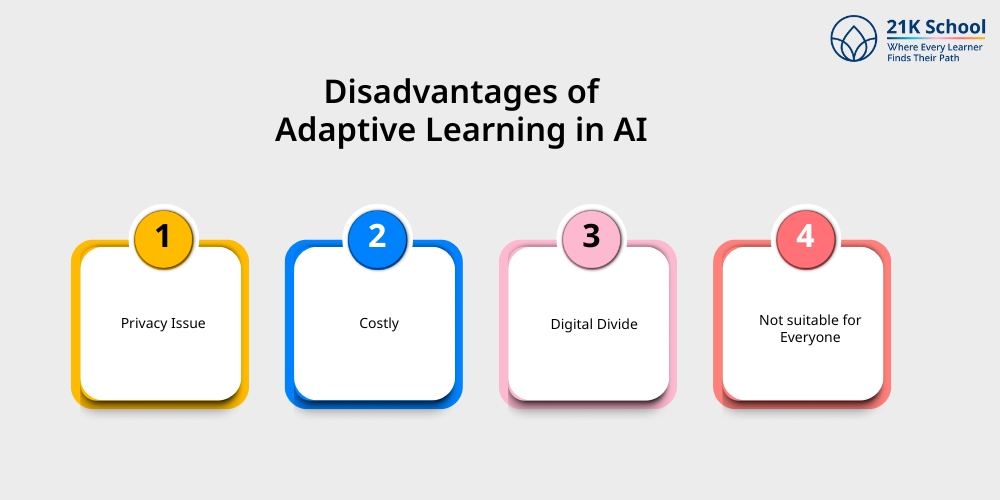
Adaptive learning in AI is known for its various benefits, but along with the benefits, it has so many disadvantages which hamper the implementation of the process.
These disadvantages are basically privacy issues, technological cost, failure and so on, which hamper students’ educational experience as well. Here you can check the disadvantages of adaptive learning in AI.
1. Privacy Issue
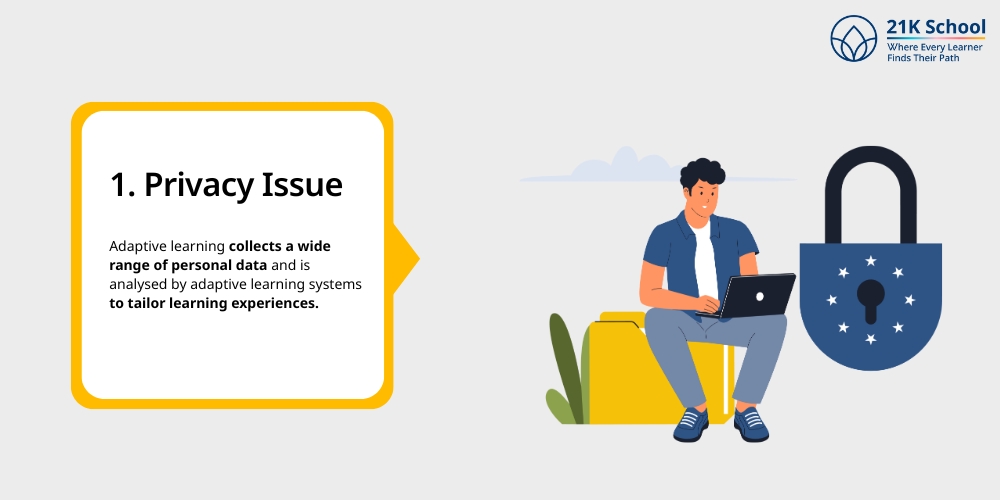
Privacy issues are a major problem of AI in adaptive learning. Adaptive learning collects a wide range of personal data and is analysed by adaptive learning systems to tailor learning experiences.
There is a possibility that it will store and process private data about students’ performance, learning preferences and even personal information, which is a serious privacy concern.
2. Costly
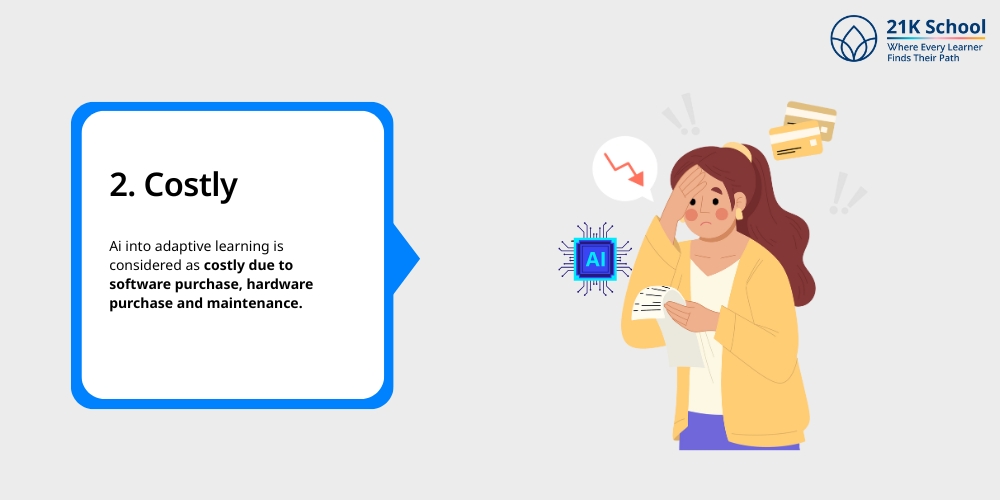
Ai into adaptive learning is considered as costly due to software purchase, hardware purchase and maintenance.
Due to rising prices of these AI tools, it becomes tough for schools and corporate sectors to allocate funds equally in these tools. Due to high high cost it becomes tough to implement AI in adaptive learning.
3. Digital Divide
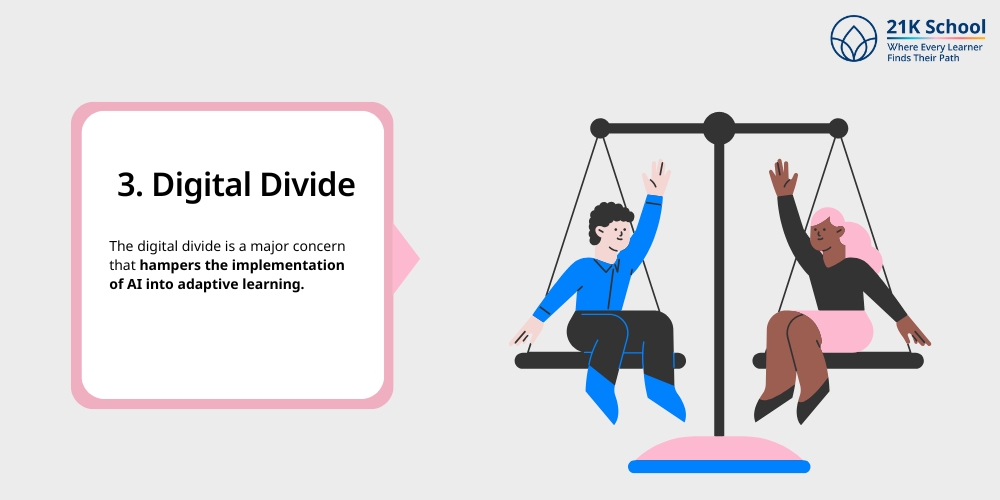
The digital divide is a major concern that hampers the implementation of AI into adaptive learning. Due to the digital divide many students are unable to access equal educational resources, which hampers their digital learning process.
Children who belong to a lower economic group mostly face digital disparities. Children from poor backgrounds face difficulties in accessing adaptive learning, mainly because of a lack of devices or reliable internet access.
4. Not suitable for Everyone
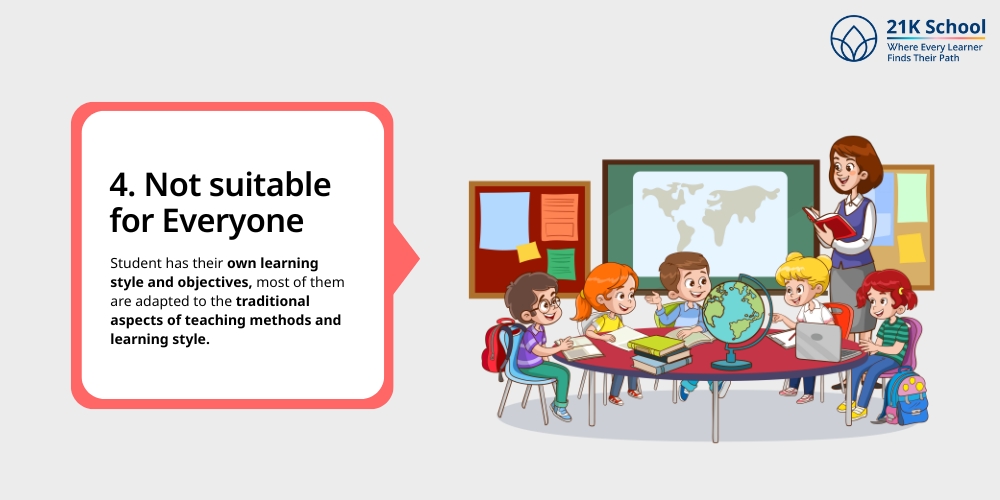
Adaptive learning in AI is not suitable for everyone. As every student has their own learning style and objectives, most of them are adapted to the traditional aspects of teaching methods and learning style.
At some time, adopting new learning experiences will hamper the growth of childrens mental health as well as cause them to develop frustration.
Future of Adaptive Learning in AI
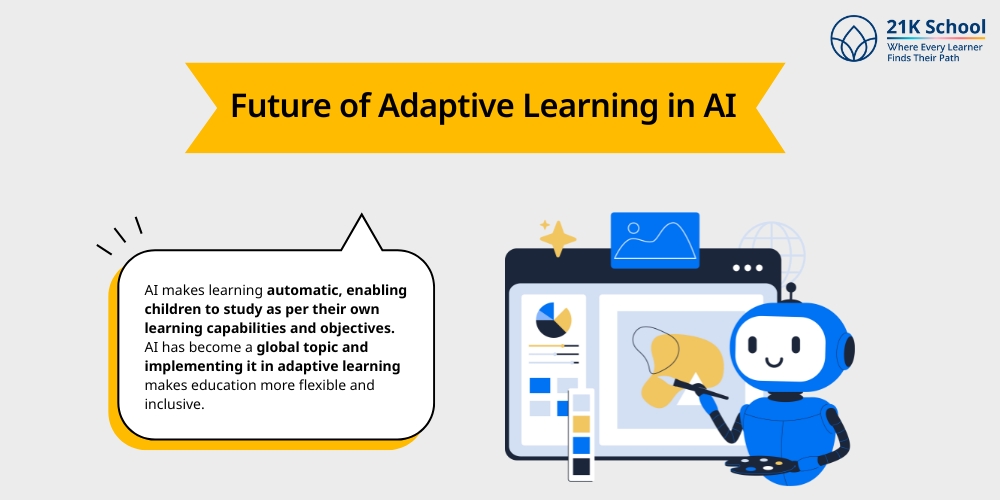
Adaptive learning in AI is expected to have vast development, due to implementation of technology into education as well as growing awareness of personalised education. AI makes learning automatic, enabling children to study as per their own learning capabilities and objectives.
AI has become a global topic and implementing it in adaptive learning makes education more flexible and inclusive. Through AI in adaptive learning students can study from any location, irrespective of any challenges or hindrances of a structured learning environment.
Machine learning algorithms, a feature of 21st-century educational technology that enables adaptive learning systems to instantly adapt to student performance and feedback, will enable personalised learning pathways.
Adaptive learning driven by AI offers a number of benefits including ensuring that each student receives instruction that is specific to their needs, which enhances understanding and memory of the subject matter.
Final Note
A revolutionary approach to education, artificial intelligence-based adaptive learning provides tailored learning experiences according to each student’s requirements and preferences.
Using collaborative learning, real-time feedback and multimedia content adaptive learning increases student engagement and supports inclusive education.
Its versatility and potential impact are demonstrated by the variety of contexts in which it is used, such as main and secondary education, corporate training, healthcare and language learning.
Nevertheless, there are drawbacks as well like budgetary and privacy issues as well as variations in technology and student flexibility.


